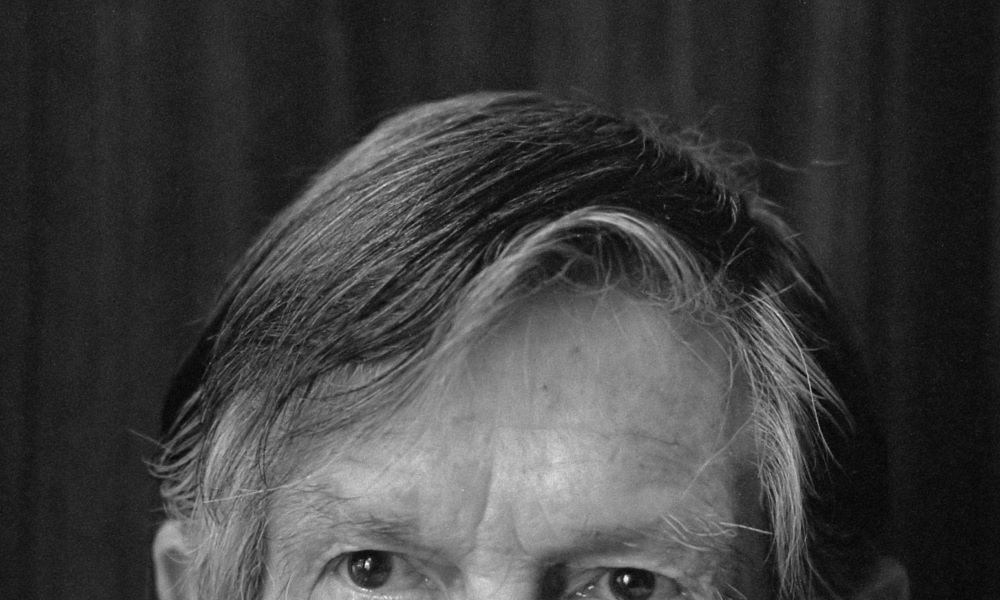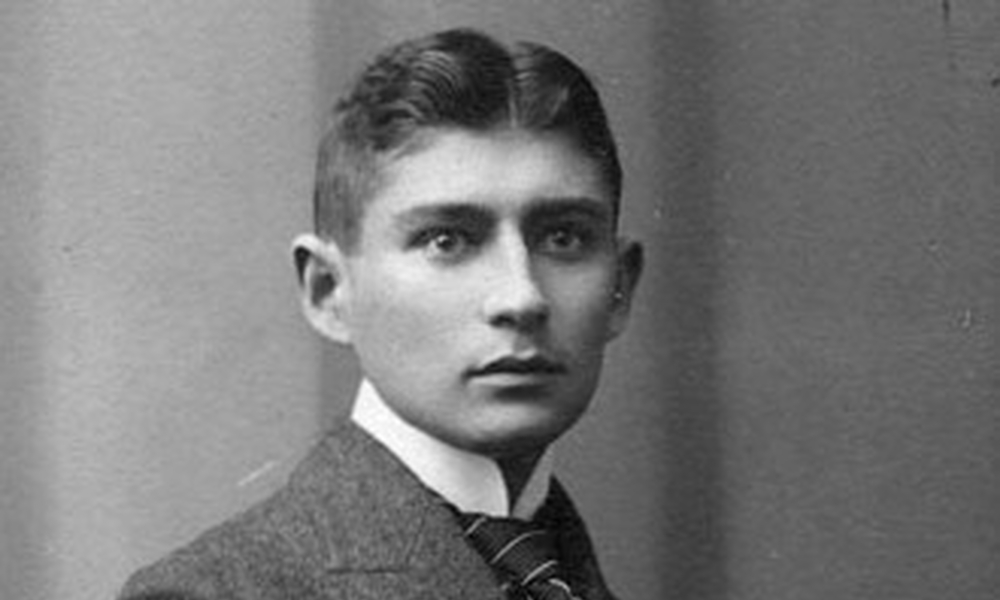Public message (7) The Silence of the Comma

‘Social distancing’ is what Corona experts advise, but ‘social nearness’ is what we aim for with our literary events. Passa Porta wants to keep connecting authors with their readers. Over the coming weeks, we will therefore be asking writers, from home and beyond, for a personal “Public Message”.
Flemish novelist and literary journalist Roderik Six sent us this mini essay on the poignant shapes of silence. Along with some literary acquaintances, he recently created the online magazine #VIRALEN.
_
A fermata is a symbol of musical notation
used to indicate a prolonged period of silence.
Another name for fermata is corona.
There is a new tyrant in town.
Its iron grip drives us inside, to where we are safe. We enjoy its absence in our new cells, its nails scratching the doorpost. The dishwasher rotates in wet circles, the patter of cats makes the parquet crack; all day long music flows from the speakers and at night we snuggle up to each other, whispering sweet words until we surrender to sleep. We drown it out. We don’t want to hear it.
There is a new tyrant in town. Silence is its name.
Once — how long ago? — the city was a breeding ground for noise. Today, empty trams silently drive by empty stops; no shrill bell warning oblivious tourists crossing, no screeching metal at every stop. The hissing espresso machines in hip coffee bars, the murmuring hubbub from the terraces, the cacophony of bicycle bells in the car-free zone, drunken voices on night squares, the loud lure of market and candy vendors, the clinking of glasses and cutlery when a restaurant door swings open, the buzz of storefront heating elements, the enticing plucking of street performers, the thundering techno beats reverberating through venue walls — it is all gone.
Silence has a weight. It makes the space heavier, the air viscous, presses on your heart as you open the door. The silence is a presence, and it’s as if you enter a secret chamber, hesitating on its threshold. You have to pull yourself together. Raise your antennae. To listen to it.
Venturing out onto forlorn streets, you flinch; you contain your steps because suddenly they sound so loud. They resound on the pavement and echo through silent mansion facades. It is your echo - the world, an invisible mirror.
You have become audible. Which strikes fear. Who is audible can get caught; we remember what it is to be prey. Out in the open we wade through the plains, a slight rustle in the bushes.
You are relieved to have arrived at the supermarket, delighted to be inside, glad to hear cheery cashier beeps, you are pleased even with the most trivial chat in the queu. But outside the silence awaits. With the patience of centuries.
The eternal space
Silence was first, it was here in the beginning. The words ‘Big Bang’ are misleading; they make us imagine fireworks, the ruckus of an infernal explosion. Lacking ether, however, this majestic unfoldment took place in sacral silence. The birth of everything happened noiselessly; the gods are taciturn workers.
Silence is the keynote of the universe. That might be the reason we turn to silence whenever we want to create. In a world so loud we cannot hear our own thoughts, we turn to monasteries and vows of silence, hoping to come closer to ourselves. We wear noise cancelling headphones, filtering out the din. We want to hear the sound of nothingness when standing in front of a blank canvas. Only then can we begin.
John Cage collected his readings in a book paradoxically titled Silence — pronouncing the word is violating its content. Through Zen Buddhism and a creative layout, Cage tempts to determine what comes before the notes and how he can make language silent. However fascinating his quest, it is obvious Cage tries to obtain the exact opposite: he intends to train our ears, he wants to improve how we listen to sound. His music — even his famous piece 4’33” — is a betrayal of silence.
Cage is aware of this failure. To obtain absolute silence is humanly impossible. He understands this after visiting an anechoic chamber, an experimental room designed to absorb all sound. It is so quiet you hear your own nervous system, and the murmur of your blood circulation is as loud as the sound of a roaring river. The experience is so profound as to make visitors fall prey to disorientation, nausea and intense hallucinations. NASA uses these rooms to train astronauts in, the universe being one big anechoic chamber. Furthermore, even the CIA showed interest: "sensorial deprivation" appears to be an ideal torture method, provided your suspect does not instantly suffer a mental breakdown. Few test subjects hold on for more than half an hour in these rooms lacking even the least bit of stimulus. Nevertheless, after his stay in the chamber Cage seems reassured:
Striking: an anechoic chamber is also called a dead room. And rightly so. Our fear of silence stems from our fear of death. It seems contradictory, considering our desire for silence preceding our creative urge, but this creative silence is only momentary, a required beginning to free our minds. It is the silence of fall we long for; autumn turning everything into humus, winter covering the world with a seemingly innocent white. The void we desire is essentially a ritualized process of dying, a cleansing, a mild encounter with death before adding yet another something to the nothing. Therein lies Cage’s passion for silence: in breaking it as best he can. His silence is not that of the eternal space, it is the silence of the comma. French poet Paul Valery summed it up beautifully:
Silent demigods, a quiet firmament
Whilst contemplating we gaze into the abyss, and according to Nietzsche the abyss gazes back into us, though we never even think about stepping over the edge. That would be a journey to the absolute silence. That brief pause is frightening nevertheless - at the heart of silence resounds the echo of death.
If any author could have put into words this indefinable fear, it was Franz Kafka. His novels are in essence sheer struggles with silence. His doomed characters engage in endless conversations with bureaucratic governments, in their turn drowning him in legal gibberish, words creating only more anxiety and uncertainty, never providing a satisfactory response. The more words ricocheting about, the narrower the discourse feels. You are left with the impression characters needlessly persevere in conversation and negotiation up until they are crushed beneath the weight of words, and it has its reason: they want to drown the underlying silence.
The actual answer to all questions of life lies solely in the horrific silence — we scream to a quiet firmament.
Kafka illustrates this in one of his fabels, short stories usually re-interpreting classical mythology. Thus he reviews the myth of Prometheus from the perspective of the cliff and portrays Poseidon as a burned out civil servant never finding the time to actually sail the seas.
In "The Silence of the Sirens", Kafka reconsiders Ulysses aiming to steer his ship past the Sirens unscathed. Most sailors cannot resist their beauty, least of all their song, and steer the ship into the rocks. But Ulysses ties himself to the mast and puts wax in his ears so as not to be tempted. At least, that is the classic story. Kafka's telling asserts that the Sirens' silence is an even more deadly weapon than their song.
Silent demigods, a quiet firmament — that is the real nightmare.
But Ulysses does escape, and Kafka provides us with some possible interpretations. Ulysses was thus convinced by his own remedy, that the Sirens fell quiet upon seeing his confidence. Or vice versa, the Sirens were so enthralled by this handsome traveller that they stared at him with open mounds, making Ulysses think he was surrounded by arias. Or, and this is how Kafka deviously ends his story, Ulysses knew they were silent, and this was all just a charade.
In Kafka’s work, Ulysses’ victory is either based on a mutual misunderstanding, or the hero recognized there was in fact no real adversary, that the cliffs were empty and the threat only an illusion. Either way silence wins. What else is a misunderstanding but a failure of words, and what is the sound of absence?
Pause
Now that we have pressed pause, we can hear the silence.
To some, the muted world is most convenient, a quiet moment to rediscover what really matters. Others try to drown the silence in an attempt to overcome the abyss without having to gaze into it. As indifferent as it may be, the silence shall not be ignored; it forces itself upon us like a tyrant, forcing us to reflect on our lives.
Silence silences us. And that might just be its greatest gift.
Roderik Six, April 2020
Translated from the Dutch by Melissa Giardina.


